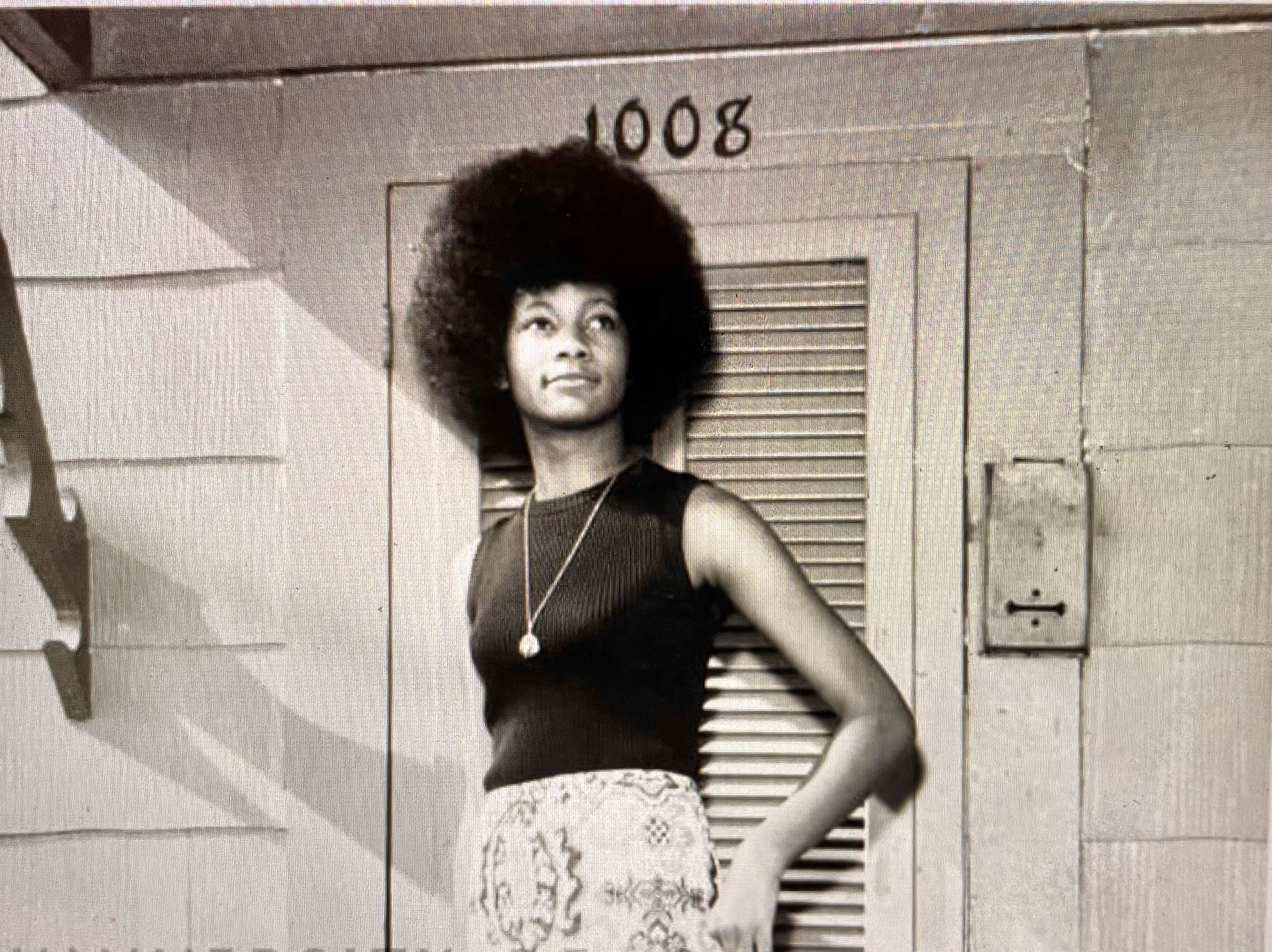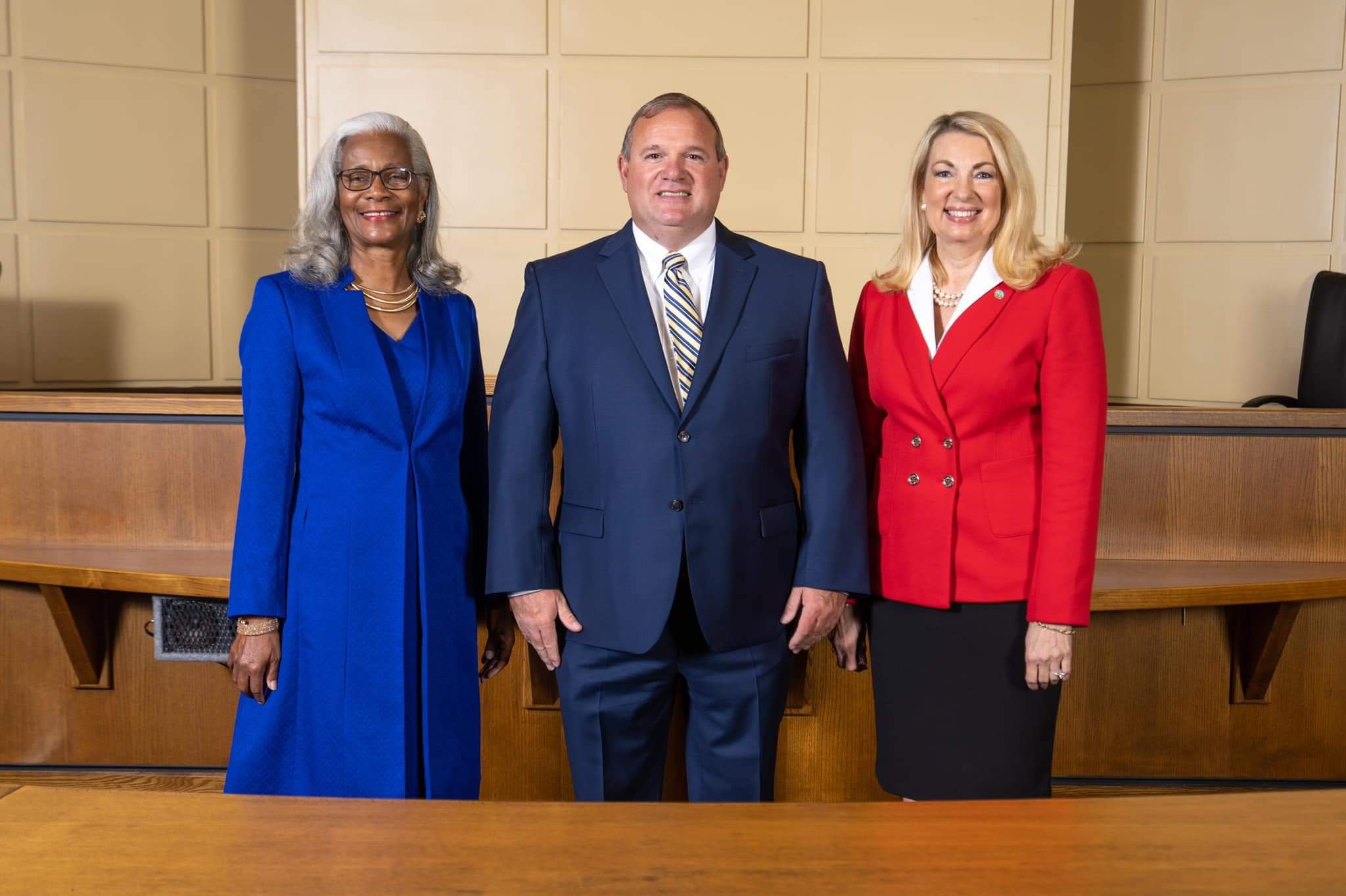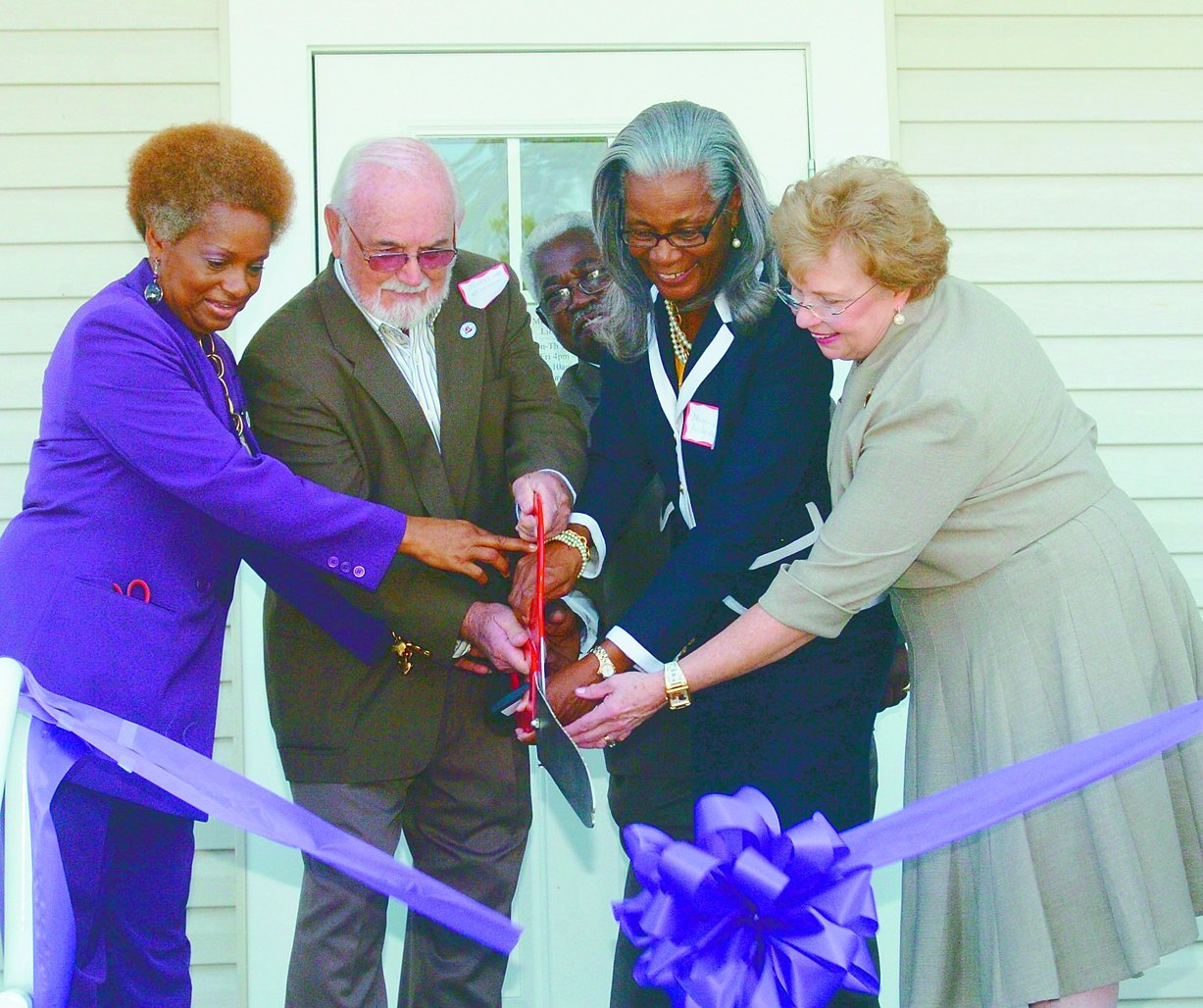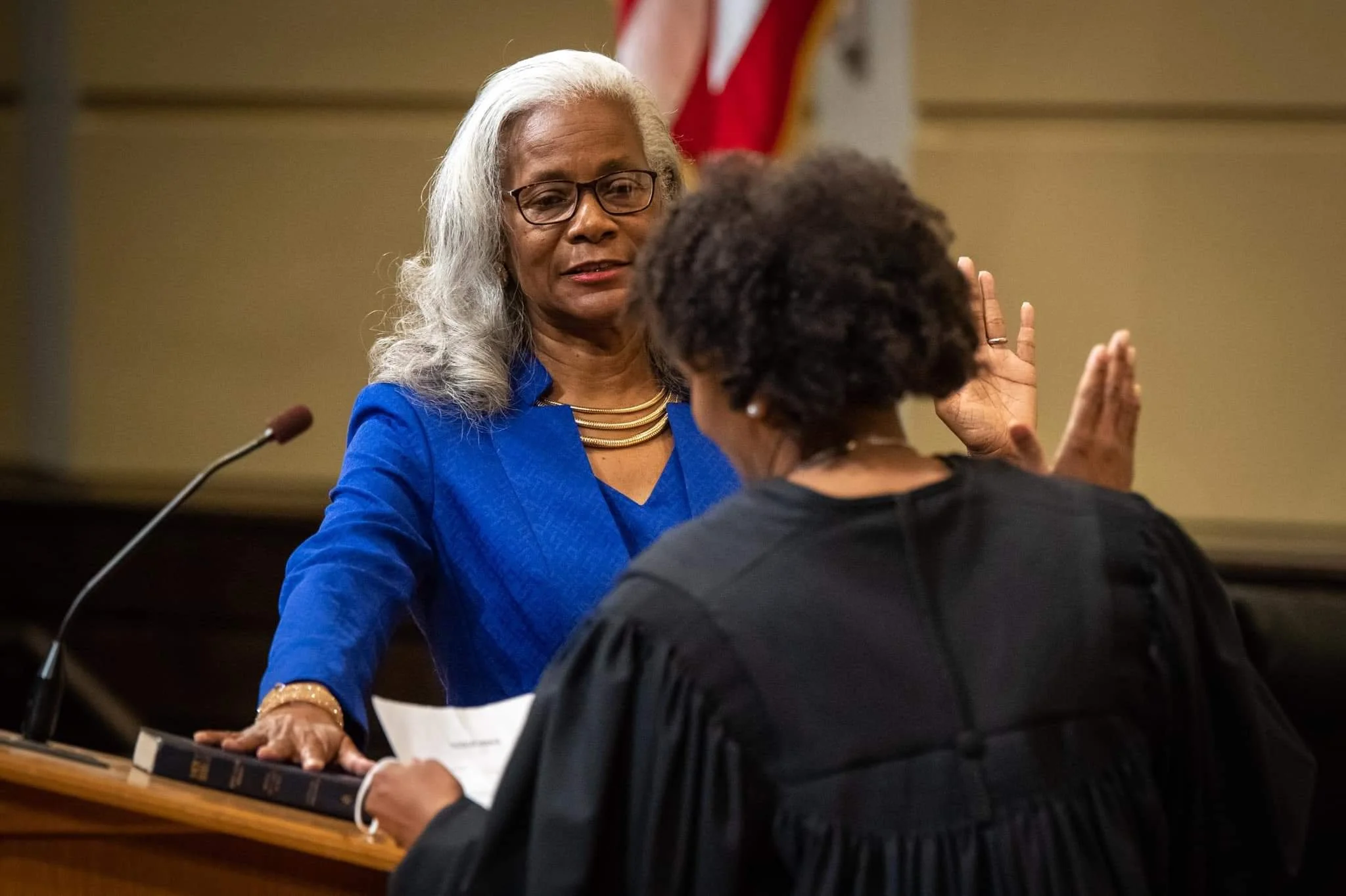AND STILL SHE RISES
From attending segregated schools in Mobile to being elected Mobile County Commissioner
for District I, Merceria Ludgood has come a long way. Spending her entire career giving a voice to the voiceless and being unafraid to take her seat at the table, her commitment to serving her community is informed by the myriad challenges she faced and her understanding that diversity in leadership roles is crucial for change. Her story and advice for those wanting to be leaders in any field is a testament to both her humility and her leadership.
By Amber Wielkens
If you want to understand Merceria’s dedication to fighting injustice, look no further than her childhood. The oldest of four children, she grew up in the Crichton community. “I attended segregated schools through 12th grade,” she begins. “In elementary school, I distinctly remember having used textbooks, apparently discarded from white schools. My most vivid memory is my fourth-grade social studies book called Know Alabama. It included derogatory images of Black people and students had written awful words beside them. After that experience, my mother started purchasing our textbooks new from Anders Bookstore.”
Her mother was a teacher, her father a construction worker, and they protected their children as much as they could from the dehumanizing segregation and racism that were woven into their lives. “They reared us to believe that if we got a good education and worked hard we would be able to achieve whatever our hearts desired. That turned out to be far more complicated than they let on,” she admits.
Although she wouldn’t have called herself an activist, Merceria’s mother ticked all the boxes of the definition of the word. “She, along with others in our community, regularly petitioned city leaders and attended City Commission meetings and their concerns were summarily dismissed,” she says. “City Commission members were elected at-large and felt politically comfortable turning a deaf ear to the needs of Black communities. The same scenario was played out all over the city. The effect of decades of neglect and lack of investment persists even today.” Her parents’ steadfast belief in speaking out and Merceria’s spending her childhood bearing witness to unspeakable acts like the bombing of the 16th Street Baptist Church in Birmingham that killed four young girls close to her own age shaped her tremendously. “These experiences and others engendered in me a burning desire for learning and a commitment to resisting injustice that have characterized my life’s work,” she says.
““IT’S IMPORTANT TO UNDERSTAND THE OPPOSING VIEW. I LIKE TO THINK THAT MY IDEAS ADD VALUE TO THE COMMUNITY AND I MAKE COMPELLING ARGUMENTS FOR THEM.””
Asked if she already knew her vocation when she started attending The University of Alabama (UA), which was desegregated but still a racist stronghold, she replies, “There were aspects of my calling that I’ve known from an early age. My experience at UA brought it into sharp relief. Having managed in a segregated world before UA, I had literally no idea how to live alongside white people, many of whom had no desire to live alongside me. Notwithstanding the racism that was baked into my UA experience in the early 1970s, my years there, the education I received, and my personal growth while there uniquely prepared me for the work I am called to do.” She went on to continue her education, earning two masters degrees and graduating from the prestigious Antioch School of Law.
From there, Merceria launched her career as an attorney, quickly rising to leadership positions in the state and then nationally in Washington, DC. Why did she return to Mobile? “It was time to come home. I’ve always known my contribution should be here. After evaluating my next steps, an opportunity to return to county government presented itself. My stint as City Attorney was serendipitous,” she says, further explaining, “Our then all-Republican County Commission was purging itself of known Democrats and did not renew my contract, which expired April 2007. It was disturbing at the time, but I now know it was part of God’s grand design for my life.”
She’s modest to a fault, saying, “I don’t refer to myself as a leader because it feels presumptuous. Some years ago, I interviewed a woman who was a leader in her West African community and she said, ‘My path was set by the ancestors; I must walk in it.’ That sentiment captures how I see my own leadership experiences. Those before me did what they could to bring about change and it’s my responsibility to continue what they started.”




An iron fist in a velvet glove might be one way to describe her. Facing challenges head-on is part of who she is, but first, she considers all aspects of the problem. “It’s important to understand the opposing view. I like to think that my ideas add value to the community and I make compelling arguments for them,” she says. She tries to assume everyone is well-intentioned, but if the facts say otherwise, she won’t hesitate to call it out. “During my time in public life, I’ve learned there are those for whom the status quo is a sacred cow. If maintaining the status quo means blocking positive change for our community, I will use the tools at my disposal to dismantle it.”
Another pro tip for future leaders? “Listen closely for points of agreement in situations where there are differences of opinion, and build on those points to get to a solution. I’m willing to incorporate other perspectives and approaches. In other words, things don’t have to my way—unless the dichotomy is my way or the wrong way. If it’s a choice between right and wrong, I am going to choose right.” Isn’t this what good leaders do? Creating spaces where challenging conversations can lead to common ground to solve problems together seems to us the epitome of leadership.
As a Black woman in politics, she is well aware of the lack of representation of both women and people of color. While many are well qualified, there is a fear of running for office. Merceria says, “The first question I asked myself when contemplating my run for office was whether I would personalize a loss as a rejection by the community. Once I became comfortable that I could go back to my life as a private citizen and continue to contribute, I was ready to take the leap,” adding, “Running for office says ‘I’m willing to work at this level to make our community better.’”
““LISTEN CLOSELY FOR POINTS OF AGREEMENT IN SITUATIONS WHERE THERE ARE DIFFERENCES OF OPINION, AND BUILD ON THOSE POINTS TO GET TO A SOLUTION.””
Future leaders should understand that diversity in leadership provides for better community outcomes. “For example, if you’ve always lived in a community that had adequate recreational opportunities, you may not know that there are many communities for which that is not the case. Decisions made by elected officials impact every diversity dimension imaginable,” she says. “We have a long history of deciding what is best for people without asking their opinions. Compare the condition of neighborhoods whose interests were represented in leadership to those whose were not. The finding makes clear why diversity in leadership matters.”
With her signature gray hair, chic suits, and more often than not wearing a string of pearls, Merceria curates a timeless look. Aging? She couldn’t care less. “I completed requirements for college graduation at age 20. I wanted to be perceived as older so I would be taken seriously, so aging has never really bothered me. I honestly don’t give much thought to society’s fascination with youthfulness; my goal is to be relevant—that has little to do with age,” she affirms. More importantly, she says, “Making peace with your own aging enables you to mentor and support younger people. You see them as successors, not competitors.”
As we wrap up, Merceria imparts a final bit of well-earned wisdom, saying, “My favorite thing about aging is that it crystallizes your priorities. Your mortality is front and center. You ask yourself how you want to spend your final years. I’ve eliminated most things I was doing because someone else wanted me to, enabling me to pursue the things that are important to me.”









